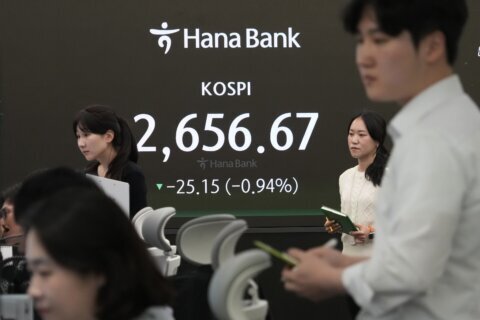BANGKOK (AP) — Shares were mostly lower in Asia on Friday after stocks pulled back from their recent record highs on Wall Street as bond yields fell and investors turned cautious.
Tokyo’s Nikkei 225 lost nearly 2%. Shares fell in Seoul, Sydney and Shanghai but rose in Hong Kong.
U.S. futures declined and the yield on the 10-year Treasury note rose to 1.34%. On Thursday it fell to 1.30%, its lowest level since February. It recently was trading at 1.74%.
Traders have been shifting money into bonds in recent weeks, pulling down the benchmark yield, which is used to set rates on mortgages and many other kinds of loans.
Tokyo’s Nikkei 225 was down 1.7% at 27,633.10 while the Kospi in South Korea declined 1.5% to 3,201.86.
In both countries, authorities have tightened pandemic precautions to counter fresh outbreaks of the coronavirus. Ramping up relatively loose restrictions, Japanese Prime Minister Yoshihide Suga ordered a state of emergency for Tokyo, to run through the July 23-Aug. 8 Olympics.
Investors are gauging the potential impact from COVID-19 variants stymying a resurgence in commerce and travel. Fans have been banned from the Tokyo Olympics following a state of emergency aimed at containing rising coronavirus infections in the capital.
Sydney’s S&P/ASX 200 gave up 1.3% to 7,245.10 while the Shanghai Composite index lost 0.7% to 3,501.16. Shares also fell in India and Taiwan, but they rose in Hong Kong, where the Hang Seng index gained 0.7% to 27,330.71.
On Thursday, the S&P 500 fell 0.9% to 4,320.82, weighed down by a broad slide driven mainly in technology, financial, industrial and communication companies.
The Dow Jones Industrial Average lost 0.7% to 34,421.93. The Nasdaq composite snapped a three-day run of closing highs, sinking 0.7% to 14,559.78.
Smaller company stocks also fell. The Russell 2000 index slid 0.9%, to 2,231.68.
Longer-term bond yields tend to move along with investors’ expectations for inflation and economic growth. Both are still very strong and much higher than they’ve been in recent years. But Wall Street increasingly suspects they’ve already topped out as the economy moves past the initial catapult phase of its recovery from the pandemic.
Part of the sharp drop in long-term bond yields could also be attributed to investors quickly reversing bets that they would continue rising as the economy continued its sharp recovery.
Two recent reports showed that the manufacturing and services sectors are still growing, but more slowly than in previous months and below economists’ expectations.
On Thursday, the Labor Department said the number of Americans filing for unemployment benefits rose slightly last week even while the economy and the job market appear to be rebounding from the coronavirus recession.
Investors are increasingly jittery over potential moves by central banks, especially the U.S. Federal Reserve, to wind down lavish support for markets that cratered at the outset of the pandemic.
Minutes from the Fed’s June meeting showed officials are moving closer to reducing bond purchases, though most analysts don’t expect a reduction until late this year. At that meeting, policymakers said they planned to raise interest rates as soon as 2023, earlier than previously expected.
Railroad stocks were the biggest losers in the S&P 500 Thursday following a published report saying the Biden administration plans to sign an executive order next week directing regulators to take action against consolidation and anticompetitive pricing in the railroad and ocean shipping industries. The report, published by The Wall Street Journal, cited an unnamed source familiar with the situation. Kansas City Southern sank 7.9% for the biggest loss in the S&P 500. Norfolk Southern slid 7.2%, CSX fell 6.2% and Union Pacific closed 4.4% lower.
Investors will be turning their attention to corporate earnings starting next week, when major banks like JPMorgan Chase, Goldman Sachs and Bank of America report their results. Banks tend to be a proxy for the overall economy, so investors will be analyzing the reports closely and listening to what banks say about the status of lending and spending as the recovery continues.
___
AP Business writers Alex Veiga and Damian J. Troise contributed.
Copyright © 2024 The Associated Press. All rights reserved. This material may not be published, broadcast, written or redistributed.






